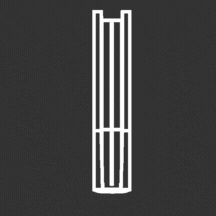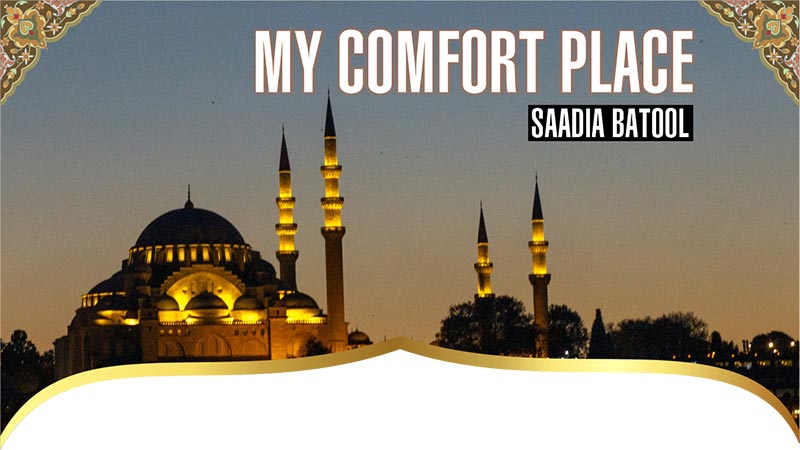In today’s modern world, youth face numerous challenges leading to mental health disturbance. Financial catastrophes, economic, social and most importantly academic pressures, coupled with identity crisis and feelings of isolation, often cause severe anxiety, stress and downfall in life satisfaction. Whereas modern psychology has made significant advancements, there remains the dire need to strengthen inner peace, self-contentment, ethical values and self-awareness deep down into the soul.
Most commonly stress is defined as emotional and mental disturbance caused by external factors. Basically, it arises when we face a problem or challenge without finding an obvious solution. In other words, it happens when distressing and negative thoughts plague us about upcoming situations, events or tasks. Being modern young generation, we face these challenges on daily basis, so these high expectations, social comparisons, and the constant digital flow leave us restless and mentally fatigued.
In holy Quran, Allah Almighty addresses the stress as divine trial for mo’min in Surah Baqarah verse 155.
وَ لَنَبْلُوَنَّكُمْ بِشَیْءٍ مِّنَ الْخَوْفِ وَ الْجُوْعِ وَ نَقْصٍ مِّنَ الْاَمْوَالِ وَ الْاَنْفُسِ وَ الثَّمَرٰتِ ؕ وَ بَشِّرِ الصّٰبِرِیْنَۙ
‘Moreover, We will most surely test you with something of fear and hunger and loss of wealth, lives and fruits. And give glad tidings to the patient.’
Here, Allah Almighty reminds us that these tests are opportunities for internal grooming, spiritual refinement and strengthening our resolve. Through these divine trials, a true Muslim and Mo’min can become firm in true belief, resilient in soul, and patient in the face of adversity, earning the blessings and reward promised by Allah Almighty. Holy prophet Muhammad ﷺ always emphasized this in teachings that those tested frequently with calamities are dearer to Allah Almighty and they must believe and respond in accordance with Allah’s command as said in Surah Baqarah verse 156.
الَّذِیْنَ اِذَاۤ اَصَابَتْهُمْ مُّصِیْبَةٌ ۙ قَالُوْۤا اِنَّا لِلّٰهِ وَ اِنَّاۤ اِلَیْهِ رٰجِعُوْنَؕ
‘Those who, when a calamity befalls them, say: Indeed, to Allah, we belong, and to Him, we shall return.’
The greater the desire for Qurb e Illahi, (Nearness to Allah Almighty) and the higher the spiritual goal, would be more we will face trials, as Allah Almighty illustrates:
اَمْ حَسِبْتُمْ اَنْ تَدْخُلُوا الْجَنَّةَ وَ لَمَّا یَاْتِكُمْ مَّثَلُ الَّذِیْنَ خَلَوْا مِنْ قَبْلِكُمْ ؕ مَسَّتْهُمُ الْبَاْسَآءُ وَ الضَّرَّآءُ وَ زُلْزِلُوْا حَتّٰی یَقُوْلَ الرَّسُوْلُ وَ الَّذِیْنَ اٰمَنُوْا مَعَهٗ مَتٰی نَصْرُ اللّٰهِ ؕ اَلَاۤ اِنَّ نَصْرَ اللّٰهِ قَرِیْبٌ
(O believers!) Do you suppose that you shall enter Paradise, though the like of that (suffering) has not yet come to you, which was endured by those who passed away before you? Affliction and adversity befell them, and they were so (severely) shaken that even the messenger and the believers with him said: ‘When will Allah’s help arrive?’ Indeed, Allah’s help is ever near.
So, the beloved of Allah tested frequently in different manners for their love for Allah Almighty. Even the companions of Holy Prophet Muhammad ﷺ experienced sufferings and hardships to such extent that they demanded for Allah’s help. All these trials are blessings for true mo’min as these tests shape resilience, istaqamat and faith in them, teaching that real success and Divine pleasure come through Taqwa, (God-consciousness) tawakul (Trust on Allah) and perseverance.
Another common natural response in youth is anxiety which becomes overwhelming when it is continuous and may lead to distress and critical mental health problems. In holy Qur’an, Allah Almighty highlights Khauf (fear) and Huzn (sorrow) are also common responses in human nature. Imam Ibn Qayyim Al Jauziyah explains that Khauf e Illahi or Khashiyat e Illahi guides a true believer, illuminates his heart, and directs towards Divine proximity. When stress and anxiety prolonged, they may indulge you in hopelessness and depression and severely affect the clarity of perception. In Holy Qur’an Surah Al Baqarah verse 10, Allah Almighty says
فِیْ قُلُوْبِهِمْ مَّرَضٌ ۙ
There is a sickness in their hearts,
Here, Allah Almighyt is highlighting the destructive power of negative emotions such as grudges, envy, hypocrisy, and inner turmoil. All such emotions destroy you from deep inside and leave you in miserable condition for rest of life. Therefore, Allah Almighty advised believers to seek purification of heart and Ikhlas (sincerity) to get rid of spiritual heart diseases. In this context, Allah Almighty ordered us to seek help from Sabr (patience) and Salah (prayer) and He also emphasizes Khashiyat e Illahi as stated in Surah Al-baqarah verse 45.
وَ اسْتَعِیْنُوْا بِالصَّبْرِ وَ الصَّلٰوةِ ؕ وَ اِنَّهَا لَكَبِیْرَةٌ اِلَّا عَلَی الْخٰشِعِیْنَۙ
Take recourse to patience and prayer. It may indeed be hard, except for the devoutly humble.
These divine instructions from Allah Almighty clearly direct us towards the prayer mat as the physical and spiritual locus where our weak souls may find inner peace, comfort, healing and calmness. If we reflect upon our own state, we perform ablution meticulously, offer prayer punctually, and recite dhikr, yet our hearts frequently feel distant. Our tongues recite but we failed to feel the real taste of dhikr e Illahi and soul does not tremble with khashiyat e illahi. During prayer, our mind drifts endlessly into worldly distractions. In-spite of this, we find ourselves standing on prayer mat, wishing to feel that we are not in this materialistic world but in front of our Allah Almighty. We yearn for that precious presence, where our body trembles as we recognize the majesty of the Most Supreme. We desire for that moment from the core of our heart, when we cannot see, hear or feel anything else but Him, immersed in His beauty, feels His love for His servants, as if the entire world around us has faded.
The prayer mat, in this sense, becomes our true comfort zone, a silent companion to our feeble and wounded souls. It becomes a place for us where our anxieties dissolve, and the heart can speak freely to our beloved Allah Almighty. Our beloved Holy Prophet Muhammad ﷺ frequently affirmed the profound significance of Salah.
جُعِلَتْ قُرَّةُ عَيْنِي فِي الصَّلَاةِ
(The coolness of my eyes lies in prayers)
(Sahih al-Bukhari, 3939; Sahih Muslim, 1823)
The prayer mat is not a ritualistic object but a sanctuary for the soul, an intimate space where one learns the meaning of patience, trust, and devotion.
Shaykh ul Islam Dr Muhammad Tahir ul Qadri beautifully describes that the real essence of prayer does not reside in physical movement of body only, but it lies in Hudoor e Qalb (the presence of heart). Salah (prayer) without Ikhlas and heartfelt presence is just like a body without soul and it’s also true for all deeds as well. Imam al-Ghazali narrates that Ghaflah (heedlessness) in remembrance and worship of Allah Almighty blinds our hearts from the nearness of Allah, while Hudoor e Qalb opens the door to divine light for us.
Prof Dr Allama Iqbal addresses the performing of worship without spiritual awareness in following words. He calls the youth to rise beyond ritualism, to awaken their blind hearts to divine love and taste the sweetness of Dhikr e Illahi.
ترا امام بے حضور، تری نماز بے سرور ایسی نماز سے گزر،ایسے امام سے گزر
Thy imam is without presence, thy prayer without ecstasy—Reject such a preyer, reject such an imam (Zarb-e-Kalim)
Mawlana Rumi describes this sacred longing beautifully:
“When I am with You, we stay up all night.
When You are not here, I can’t go to sleep.
Praise be to God for these two insomnias —
and the difference between them.”
The prayer mat is that threshold between two worlds — the material and the Divine. There, the heart learns to see without eyes, to listen without ears, to speak without words. There, the world dissolves, and only Allah remains.
Every sincere prostration in front of Allah Almighty becomes an act of healing, every precious moment of focused Dhikr e Illahi transforms anxiety into serenity as Allah Almighty states that in Surah ar-Ra’d verse 28.
اَلَا بِذِكْرِ اللّٰهِ تَطْمَىِٕنُّ الْقُلُوْبُؕ
Indeed, it is by Allah’s remembrance that hearts find peace.
In this way, the prayer mat, then, is not merely a material object; rather it becomes a spiritual anchor. It’s the place where we may find relief from fear and distress, cultivate patience, and experience the sweetness and fragrance of divine remembrance. It’s the place where our restless soul finds rest from worries of materialistic world.
Standing on the prayer mat, we can transcend the noise of worldly echoes. Our body bows down, lips recite, and the heart gradually awakens to presence of Allah Almighty. In such sacred moments, time slows, and the Divine becomes profound. Allah Almighty reminds us in our distress that His help is near, guides us to strength and steadfastness. We are called to reclaim our connection, to turn our anxieties into devotion, and to make our prayer mat a sanctuary for our hearts.
If I reflect upon my personal struggle with my heedless prayers, there is still hope. Indeed, the yearning to reconnect is itself a mercy from Allah Almighty, a signal that the heart still seeks Him, and soul still remembers. May every young believer hear the whisper: return to your Allah Almighty, stand in front of Lord, bow down to prostrate, speak, weep, and listen to Divine echoes. The wounded heart only then rediscovers its home, and feeble soul awakens to infinite presence of Allah.
True comfort, true solace, and true joy lie not in worldly achievements, social acceptance and transient pleasure. Literally, they lie in standing on prayer mat, offering your Salah in true sense with Khashu o Khadu, (humility and submission) immersing yourself in remembrance of Allah, and finding a refuge where heart, mind, and soul get covered in internal peace. It is concluded that modern youth, burdened by trials, anxiety, and disconnections, can rediscover the Divine light of Sabr, Ikhlas, and proximity – transforming the prayer mat into a heaven, a sanctuary, and a best friend.


